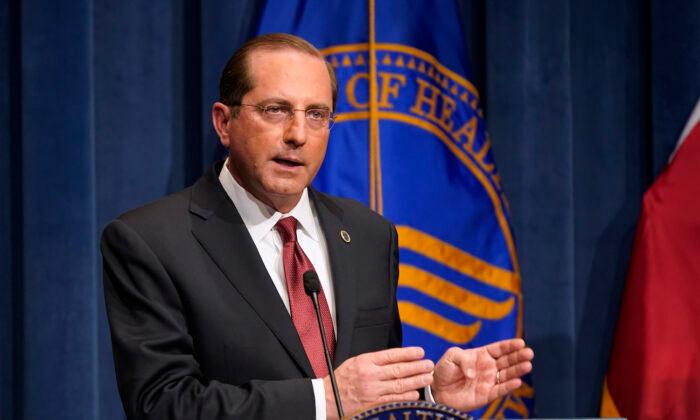U.S. Health and Human Services Secretary Alex Azar said that China’s lack of transparency and action had left the United States “flying blind” and compromised its early response to the CCP virus.
“The genetic sequence of SARS-CoV-2 in China was not shared until Jan. 9, 10 days after the virus was reported to the media, and likely one or two months after it had actually appeared,” he said.
“Being able to investigate the virus in January would have helped the United States and the world develop a science- and data-driven response. Instead, we were flying blind with human to human transmission of the virus not officially confirmed until Jan. 20.”
Azar told the Heritage Foundation that the United States learned of an outbreak in Wuhan, China on Dec. 30, 2019, “not through that country’s official channels as required under the international health regulations, but through media monitoring that we do as well as through notification from Taiwan’s Economic and Cultural office here in the United States.”
“That’s right. One of the very first ways that the U.S. government was notified of a novel virus in Mainland China was by people from Taiwan,” he emphasized.
Azar said that he and other U.S. officials “suspected we could not trust the reports out of China.”
“Reports from China suggested that the virus had likely emerged there by November and the Chinese government’s explanation for the outbreak did not make sense,” he said, noting how the Chinese CDC Director Gao Fu had told U.S. CDC Director Robert Redfield that the virus originated from animals in the Wuhan market.
“Yet in the first week of January there were several clusters of cases within families which were very unlikely to have come from close encounters with animals, suggesting human to human transmission,” Azar said. “There was so much that we needed to know and so little information that was coming out of China.”
Azar said that starting on Jan. 3 and throughout the month, he directed Redfield to reach out to Gao to offer to provide a CDC team to assist with an investigation into the origins of the virus. This included Redfield sending a formal letter to the Chinese CDC offering full assistance on Jan. 6.
“It was not until Jan. 29 that our offer was even officially acknowledged,” Azar said. “By that time, one major focus was pushing for an immediate deployment of an international team through WHO as is customary for potentially concerning outbreaks.”
It wasn’t until Feb. 16, 2020, that a team from the World Health Organization was deployed.
“Our team [in the United States] was also pressing for the Chinese government to send us viral isolates from patients there. And China has still, one year later, failed to provide the first generation viral isolates,” he said.
Azar said that the Trump administration offered praise to China in the early days of the pandemic in part because “with China, if you want to get access and cooperation sometimes a bit of public praise gets you further than hitting them over the head publicly.”
“We pressed them very hard and firmly in private and offered muted reinforcement in public, at least while we still thought we may be able to secure their full cooperation and compliance with international health regulations,” he shared.
“Unfortunately WHO never made the shift we did, continuing to lavish praise on China even to this day,” he said. “Our concerns were confirmed after the return of the international team organized by WHO when we learned that the scope of their work had been restricted to observing China’s outbreak response, not the origins of the virus itself.”
Azar also asserted that his recommendation for Trump to implement travel restrictions from China was ultimately the right thing to do, even though at the time some accused the administration of xenophobia.
“Ominously while China had locked down internally, they had done nothing to prevent travel by their own citizens internationally. Providing the opportunity to seed outbreaks around the world,” he noted.
Azar did not express much optimism into what the investigation will yield.
“Unbelievably it was only this week that the investigators were allowed into China,” he said. “Further, these investigators will largely examine the analyses already done by Chinese scientists.”
“This flawed scope of investigations is a result of months of negotiations over the last summer and into the fall between WHO and China with no input from the WHO executive board through which member states like the U.S. have an actual say,” he noted.
“I encourage those China Watchers here at Heritage to continue following China’s conduct around this investigation quite closely. China has spent the better part of this year shamelessly promoting an Orwellian set of events designed to persuade the world that its authoritarian form of government is best suited to respond to a public health crisis.”
“The facts are, however, that if a novel virus like this had emerged in a democratic nation, a global outbreak might never have occurred.”




